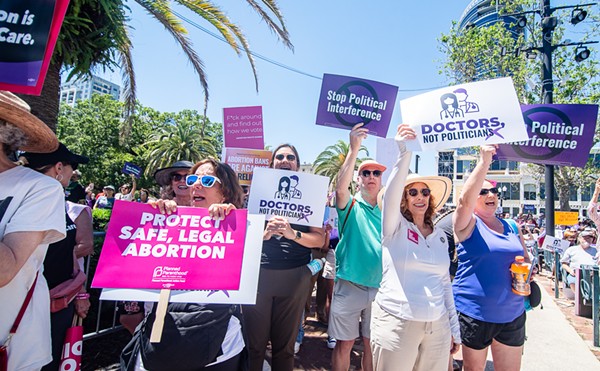"I used the condom they gave me from school, how could this have happened?" says a young girl.
"Hollywood made it seem so good," says a teenage boy.
"Once a guy has been there, once he's climbed that mountain, he's on to the next thing, he doesn't want you anymore, he's over it," says another girl.
Such are the makings of "abstinence-only" education, a strategy favored by the Bush administration to prevent teens from having sex before marriage. And thanks to a multimillion-dollar federal grant, it may be coming to a Central Florida school near you.
On Sept. 15, the U.S. Department of Heath and Human Services awarded a $2.4 million grant to the ThinkSmart program created by the Catholic Diocese of Orlando. ThinkSmart teaches teens that abstinence is the only acceptable sexual behavior outside marriage. There's no discussion of contraceptives, according to abstinence-only advocates, because that would create a "confusing message."
Dr. Wade Horn, a Health and Human Services assistant secretary and one of the Bush administration's top experts on family life, presented the first installment check of $800,000 to the Diocese's Bishop Thomas Wenski and Deborah Stafford-Shearer, the director of the Respect Life Office in downtown Orlando.
ThinkSmart relies on curriculum from two national abstinence-only programs: the Friends First S.T.A.R.S. (Students Today Aren't Ready for Sex) program, and the Project SOS program. S.T.A.R.S. is a grass-roots program that started in 1993 when a group of concerned citizens from Longmont and Denver, Colo., felt comprehensive sex education was failing to decrease teen pregnancy and STDs. The Project SOS program, self-described as "one of the largest and most successful abstinence organizations in the nation," began in St. John's County, Fla., in 1993. Since then, the program has presented seminars for middle and high school students in detention centers and schools around the state. Both programs allow teens to formally commit, or recommit, to virginity until marriage.
ThinkSmart's federal money will pay for the travel and training of instructors, food and drinks for program participants, the purchase of abstinence-only textbooks such as the S.T.A.R.S. Art of Loving Well manual, after-school programs for "peer mentoring" clubs and the creation of parent-training seminars.
Diane Brown, director of ThinkSmart and recipient of the grant, says, "This is a program where teens are being mentored by their peers. What better way to reach children than that?"
But for a program with $800,000 of federal money in the bank, and another $1.6 million promised, there are few details available. Brown couldn't say how ThinkSmart would be rolled out to local public schools, how many kids would be served, the amount of money that will be allocated to each school or how the program plans to market itself to the community.
"We are still in the early stages of planning so we haven't hammered out all the program details yet," says Brown.
INFORMATION, PLEASE
For 14 years, Orange County Public Schools have used an "abstinence-plus"Ãbased curriculum, which is what sounds like: an emphasis on abstinence, plus information about contraceptives. Orange County Public School health official Kathy Bowman-Harrow says comprehensive sex education is a huge priority.
"We strongly believe in providing medically correct information to students about safe sex and contraceptives," says Bowman. "As long as I am working here, Orange County will use a combination of both abstinence-only and abstinence-plus education. Not just one or the other."
The stats in Central Florida indicate a need for a program that works. As of May 31, Orange County has the fourth highest rate of AIDS, gonorrhea and chlamydia in the state of Florida, according to a Florida Division of Disease Control Surveillance Report from the Florida Department of Health.
According to a study conducted by the Alan Guttmacher Institute in April of 2004, more than 800,000 teenage women become pregnant each year, and about 80 percent of these pregnancies are unintended. The study also shows that Florida has the sixth highest rate of teen pregnancy in the country. Furthermore, nearly 9 million teenagers and young adults acquire an STD each year.
"That means that every hour of every day, an average of two young people become infected with HIV," says the study. "Half of the 30,000 new sexually transmitted cases of HIV infection in the United States each year occur among individuals younger than 25."
Orange County confronts the problem by telling kids to keep their pants on, while also educating them about contraceptives, an approach most Americans agree with.
In 2003, National Public Radio, the Kaiser Family Foundation and Harvard University conducted a poll on sex education. The poll found that of 46 percent of Americans believe, "The most appropriate approach to sex education is known as 'abstinence-plus' – that while abstinence is best, some teens do not abstain, so schools also should teach about condoms and contraception."
In contrast, "Fifteen percent of Americans believe schools should teach only about abstinence from sexual intercourse and should not provide information on how to obtain and use condoms and other contraception."
The study also found that a majority of Americans (55 percent) feel that educating teens about contraception will not encourage them to have sex earlier than they would have otherwise; 39 percent said this type of education would encourage them to have sex earlier.
YEAH, BUT …
Brown, of ThinkSmart, sees things differently.
"I remember having a conversation with a 12-year-old boy one afternoon about abstinence, and he asked me, 'What are you supposed to do with a girl on a date if you don't have sex?'" says Brown. "That was a real eye-opener for me."
She adds, "There is a missing link in sex education today. We've had 35 years of Planned Parenthood handing out condoms to get us into this mess we're in."
Horn, the Health and Human Services official, says we need to put an end to "sexual glorification" in our society.
"We live in a culture in which casual sex and promiscuous sex is seen as the norm. But even worse than that, it is seen as the norm without consequences," says Horn. "So why not have that little tiny message out there that says, you know what, if you're a young person and you're considering having sex or if you're having sex, one of the things you might want to consider doing is to refrain from having sex … ."
Horn says sex education programs should give clear messages about the importance of prevention. "There's a difference between prevention and intervention," he says. "Prevention is when you're trying to encourage someone not to start something, and intervention is what you do after the person has started doing it."
He adds, "We don't tell people who haven't started smoking cigarettes, 'Most of you are going to smoke, so you might as well try low-tar nicotine cigarettes.' When we're trying to prevent drunk driving, we don't say, 'We know a lot of you are going to have a few too many drinks and get behind the wheel, so we're going to teach you to use breath mints to hide the liquor on your breath.'"
Both Horn and Brown dismiss the idea that giving money to a program like ThinkSmart blurs the line between church and state.
"I'm Jewish, this is not a religious issue at all," says Brown. "This is not a sex issue or a religion issue, this is a health issue." She adds that ThinkSmart is a not-for-profit, nonreligious organization that does not espouse Catholic or religious teachings in the curriculum.
Horn says federal funding for a faith-based initiative is nothing new: "I don't know where these critics have been for the last 75 years; government has been providing funding to Catholic charities and Lutheran social services for decades upon decades.
"The issue is whether these monies are being used in a way that violates the principle of separation of church and state, and the answer to that would be yes if they were using that money to proselytize or to discriminate against a potential client based on that client's faith based perspective. They have to use the money as consistent with statute," he says.
TIME TO SWITCH?
The real damage caused by abstinence-only education, say critics, is that it siphons money from sound programs into education based on an ideology.
"These types of programs not only undercut our options for choice, but also use an issue like abstinence before marriage to impart a moral imperative in this country," says Planned Parenthood of Greater Orlando president and CEO Sue Idtensohn. "And the way that they're doing that is by taking money from science-based proposals and programs that have worked, and putting that money into abstinence-only education."
Indeed, studies on teen pregnancy rates indicate that not all the news about teens and sex is bad. The Guttmacher Institute study, for example, found that teen pregnancies are at their lowest rates in 30 years, down 28 percent since 1990. The study attributes the success to the fact that more effective contraceptives are available, "resulting in large part from greater reliance on highly effective, long-lasting hormonal methods such as Depo-Provera."
Brown believes the decrease is a direct result of abstinence-only education. "Just look at the dates. The rates went down after programs like ours started," she says.
The debate may become moot, however.
Dr. Nancy Kendall, a professor for educational leadership at FSU and a Ph.D. in international and comparative studies, recently started examining the effects abstinence-only federal funding had on sex education programs in schools. Her findings show a large percentage of public schools switching from comprehensive sex education to abstinence-only programs. Why? Because the federal aid makes it cheaper for cash-strapped schools.
"In 1988, one in 50 teachers were required to teach abstinence-only curriculum. But in 1999, one in four were required to teach abstinence-only curriculum," says Kendall. "There is an incredible transformation of schools switching to abstinence-only education because they don't have money and they rely on the federal funding, which can provide textbooks, field trips and training for teachers."
Since George Bush has been in office, there have been dramatic increases in federal funding for abstinence-only education. According to the Sexuality Information and Education Counsel of the United States (SIECUS), the government awarded $60 million to abstinence-only education nationwide in 2000. Today, over $138 million is being awarded nationwide.
Kendall says the funding increase is an alarming trend. "This type of education is failing to address the other messages kids are getting in and out of school from their surroundings," she said. "Four hours of abstinence-only education does not realistically match up to the 10 hours of MTV these teens are watching each week."


















